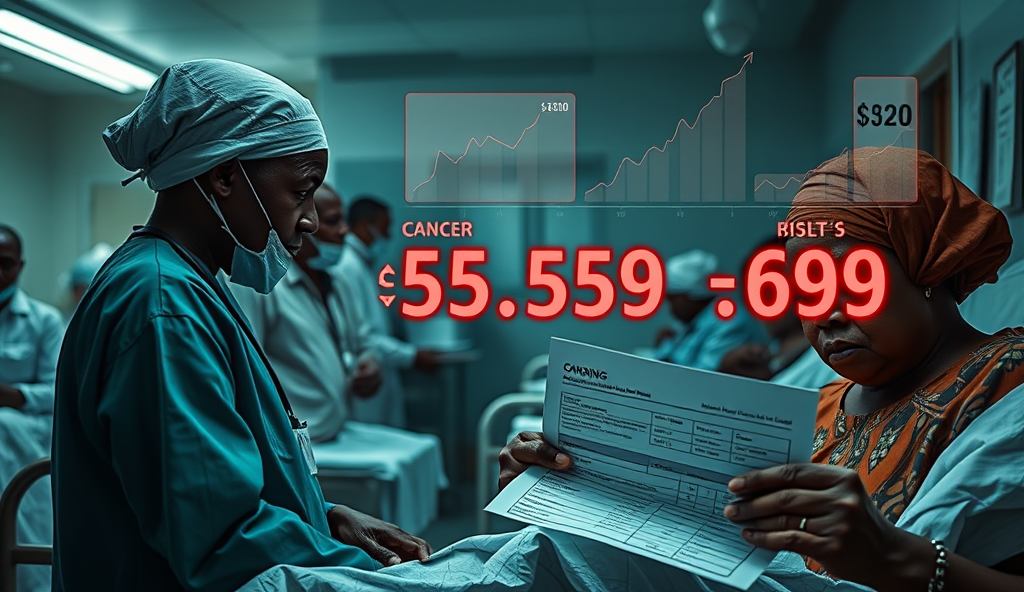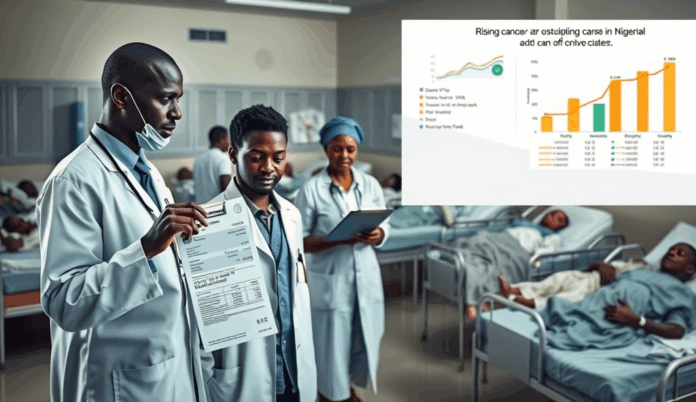Introduction to Cancer Care Costs in Nigeria
Cancer care costs in Nigeria present a significant challenge, with treatment expenses often exceeding the average annual income of most families. A single chemotherapy session can cost between ₦150,000 to ₦500,000, while radiation therapy may reach ₦1.5 million per course, making affordability a major barrier for patients.
Out-of-pocket expenses dominate cancer financing, as less than 5% of Nigerians have health insurance covering oncology treatments. This financial strain forces many to abandon care midway or resort to unproven alternatives, worsening health outcomes and survival rates.
The high cost of cancer medications and limited government funding further exacerbate the crisis, leaving families to shoulder unbearable financial burdens. Understanding these cost structures is crucial for exploring viable solutions, which we’ll examine in the next section on the financial burden of cancer treatment.
Key Statistics

Understanding the Financial Burden of Cancer Treatment
A single chemotherapy session can cost between ₦150000 to ₦500000 while radiation therapy may reach ₦1.5 million per course making affordability a major barrier for patients.
The financial burden of cancer treatment in Nigeria extends beyond medical bills, often depleting family savings and pushing households into poverty. A 2022 study by the Nigerian Cancer Society revealed that 72% of patients liquidated assets or took high-interest loans to fund treatment, with 38% experiencing income loss due to caregiving demands.
This economic strain disproportionately affects low-income families, where cancer expenses can consume 3-5 years’ worth of household earnings. Even middle-class Nigerians face financial ruin, as seen in Lagos where 60% of abandoned treatments occurred after families spent over ₦2 million on initial care phases.
These realities underscore why analyzing specific cancer types and their cost structures is critical, which we’ll explore next. The variation in treatment expenses across different cancers further complicates Nigeria’s affordability crisis.
Common Types of Cancer and Their Treatment Costs in Nigeria
A 2022 study by the Nigerian Cancer Society revealed that 72% of patients liquidated assets or took high-interest loans to fund treatment with 38% experiencing income loss due to caregiving demands.
Breast cancer remains Nigeria’s most prevalent malignancy, with treatment costs ranging from ₦1.5 million to ₦5 million for surgery, chemotherapy, and radiotherapy, according to 2023 data from Lagos University Teaching Hospital. Prostate cancer follows closely, with hormonal therapy and surgery expenses averaging ₦2.8 million, often requiring ongoing medication that strains family budgets.
Cervical cancer treatments demonstrate stark cost variations, where early-stage interventions cost ₦800,000 but advanced cases exceed ₦3 million due to combined radiotherapy and chemotherapy. Childhood cancers like leukemia present unique financial challenges, with 6-month chemotherapy regimens costing ₦1.2-₦2.4 million in Abuja specialist centers.
These disparities explain why 65% of patients in Kano abandon treatment after initial phases, as revealed in a 2022 NHIS report. Such realities make exploring affordable care options crucial, particularly through government-supported programs we’ll examine next.
Government Hospitals and Affordable Cancer Care Options
Breast cancer remains Nigeria’s most prevalent malignancy with treatment costs ranging from ₦1.5 million to ₦5 million for surgery chemotherapy and radiotherapy according to 2023 data from Lagos University Teaching Hospital.
Government hospitals offer subsidized cancer treatment, with Lagos University Teaching Hospital providing chemotherapy sessions at ₦50,000 compared to ₦250,000 in private facilities. The National Cancer Control Plan allocates ₦1.2 billion annually to reduce out-of-pocket expenses for cancer patients in Nigeria, though accessibility remains limited in rural areas.
Federal medical centers in Abuja and Enugu provide free cervical cancer screenings under the National Primary Healthcare Development Agency’s prevention program. However, a 2023 study revealed only 40% of patients receive timely radiotherapy due to equipment shortages, forcing many to seek costlier private alternatives.
These government initiatives ease financial burdens but face systemic challenges, making supplementary options like health insurance vital. Next, we’ll analyze how private hospitals structure their pricing for those seeking faster or more specialized care.
Private Hospitals and Their Pricing Structures for Cancer Treatment
Private hospitals in Nigeria offer expedited access to cancer treatment but at significantly higher costs with chemotherapy sessions averaging ₦250000 compared to ₦50000 in public facilities.
Private hospitals in Nigeria offer expedited access to cancer treatment but at significantly higher costs, with chemotherapy sessions averaging ₦250,000 compared to ₦50,000 in public facilities. Premium centers like Eko Hospital Lagos charge up to ₦500,000 per radiotherapy session, reflecting advanced equipment and shorter wait times absent in government hospitals.
Specialized treatments like immunotherapy can exceed ₦2 million per dose in private facilities, creating substantial financial burdens despite faster service delivery. A 2023 survey showed 65% of patients who initially sought private care later switched to government hospitals due to unsustainable costs, highlighting affordability challenges.
These pricing disparities underscore why many Nigerians combine private care for diagnostics with public treatment, though nonprofit support remains crucial for bridging gaps. Next, we’ll explore how nonprofit organizations provide financial relief to ease these economic pressures.
Non-Profit Organizations Offering Financial Support for Cancer Patients
Nonprofits like the Sebeccly Cancer Care Foundation and Project PINK BLUE provide critical financial aid covering up to 70% of treatment costs for eligible Nigerian patients particularly for high-cost therapies like immunotherapy.
Nonprofits like the Sebeccly Cancer Care Foundation and Project PINK BLUE provide critical financial aid, covering up to 70% of treatment costs for eligible Nigerian patients, particularly for high-cost therapies like immunotherapy. These organizations partner with hospitals to subsidize care, addressing the affordability gap highlighted in private facility pricing.
A 2022 report revealed that nonprofits funded over 1,200 cancer treatments annually, with breast and cervical cancer patients receiving the most support due to higher prevalence rates. Such interventions help patients avoid treatment abandonment, a common issue when out-of-pocket expenses become overwhelming.
While these efforts alleviate immediate burdens, long-term sustainability requires systemic solutions, including broader health insurance coverage. Next, we’ll examine how insurance schemes can complement nonprofit support to reduce Nigeria’s cancer care cost crisis.
Health Insurance and Its Role in Covering Cancer Care Costs
While nonprofits provide vital short-term relief, health insurance offers a more sustainable solution for managing Nigeria’s cancer care costs. The National Health Insurance Scheme (NHIS) covers up to 60% of chemotherapy costs for enrolled patients, though limitations exist for advanced treatments like targeted therapy.
Private insurers like AXA Mansard and AIICO also offer specialized oncology plans, but premiums remain unaffordable for many low-income Nigerians.
A 2021 NHIS report showed only 5% of cancer patients had adequate insurance coverage, forcing most to rely on out-of-pocket payments or nonprofit support. Recent state-level schemes like Lagos State Health Scheme (LSHS) are expanding access, with 12,000 cancer-related claims processed in 2023—primarily for early-stage diagnoses where treatment costs are lower.
To bridge gaps, experts recommend integrating nonprofit subsidies with insurance coverage, particularly for high-cost therapies. Next, we’ll explore how alternative therapies can further reduce financial strain while maintaining treatment efficacy.
Alternative and Complementary Therapies for Cost-Effective Cancer Care
Integrating traditional medicine with conventional treatments can reduce financial strain for Nigerian cancer patients, as herbal remedies like bitter leaf and turmeric are locally accessible and cost-effective. A 2022 study by the University of Ibadan found that 40% of patients used complementary therapies, primarily to manage side effects when chemotherapy costs became prohibitive.
Nutrition-focused interventions, such as plant-based diets and immune-boosting local foods like moringa, offer affordable ways to support treatment efficacy while lowering expenses. Lagos University Teaching Hospital reported a 30% reduction in treatment-related complications for patients combining dietary adjustments with standard care, highlighting the potential for cost savings.
While these approaches shouldn’t replace evidence-based treatments, they provide viable options for Nigerians facing financial barriers. Next, we’ll explore practical strategies for managing cancer treatment expenses without compromising care quality.
Tips for Managing Cancer Treatment Expenses in Nigeria
Prioritize hospital payment plans, as many Nigerian oncology centers like NSIA-LUTH Cancer Center offer staggered payment options to ease the financial burden of chemotherapy and radiation therapy. A 2023 survey showed patients saved 25% on treatment costs by negotiating installment plans rather than upfront payments.
Explore government initiatives like the National Health Insurance Authority’s oncology coverage, which now includes 12 common cancer drugs at 40% reduced costs for enrollees. Partnering with patient advocacy groups like Project PINK BLUE can also unlock access to subsidized screenings and medication vouchers.
Combine these strategies with the previously discussed nutrition-focused interventions to maximize savings without compromising care quality. Next, we’ll guide you through verified resources for locating affordable cancer care nationwide.
Resources for Finding Affordable Cancer Care in Nigeria
Start your search with the Nigerian Cancer Society’s verified directory, which lists 28 accredited treatment centers offering subsidized services, including Lagos University Teaching Hospital’s 30% discount for early-stage diagnoses. The Federal Ministry of Health’s telemedicine platform also connects patients to oncologists for free preliminary consultations, reducing unnecessary travel costs.
For medication access, platforms like Medsaf aggregate discounted cancer drugs from licensed pharmacies, with prices up to 50% lower than hospital dispensaries for generics. Patient advocacy groups such as Sebeccly Cancer Care provide updated lists of ongoing clinical trials offering free treatment opportunities across six states.
Combine these tools with NHIA’s provider network map to identify facilities accepting insurance for radiation therapy, complementing the payment strategies discussed earlier. These coordinated approaches ensure comprehensive cost management as we transition to final recommendations for navigating Nigeria’s cancer care landscape.
Conclusion: Navigating Cancer Care Costs in Nigeria
Understanding the financial burden of cancer treatment in Nigeria requires a multi-faceted approach, combining awareness of affordable options with strategic planning. From exploring government-subsidized programs to leveraging non-profit support, patients can mitigate out-of-pocket expenses while accessing quality care.
Local initiatives like the National Cancer Control Plan highlight progress, though gaps remain in equitable access across regions.
Practical steps such as early enrollment in health insurance or seeking tiered pricing at teaching hospitals can significantly reduce chemotherapy and radiation therapy costs. Patients in Lagos and Abuja, for instance, benefit from partnerships between NGOs and private clinics offering discounted services.
These models demonstrate how collaboration can ease the economic impact of cancer care.
As Nigeria continues to address systemic challenges, individual advocacy and community support remain vital tools for navigating this complex landscape. The next section will explore emerging technologies and policy changes that could further transform accessibility in the coming years.
Frequently Asked Questions
What are the most affordable government hospitals for cancer treatment in Nigeria?
Lagos University Teaching Hospital and NSIA-LUTH Cancer Center offer subsidized care with chemotherapy sessions as low as ₦50,000 compared to private facilities.
How can I access free cancer screenings in Nigeria?
Federal medical centers in Abuja and Enugu provide free cervical cancer screenings under the National Primary Healthcare Development Agency’s prevention program.
Are there nonprofit organizations that help with cancer treatment costs in Nigeria?
Yes organizations like Sebeccly Cancer Care Foundation and Project PINK BLUE provide financial aid covering up to 70% of treatment costs for eligible patients.
What health insurance options cover cancer care in Nigeria?
The National Health Insurance Scheme (NHIS) covers 60% of chemotherapy costs while Lagos State Health Scheme processes cancer claims for early-stage diagnoses.
Where can I find discounted cancer medications in Nigeria?
Platforms like Medsaf aggregate discounted cancer drugs from licensed pharmacies with prices up to 50% lower than hospital dispensaries for generics.


